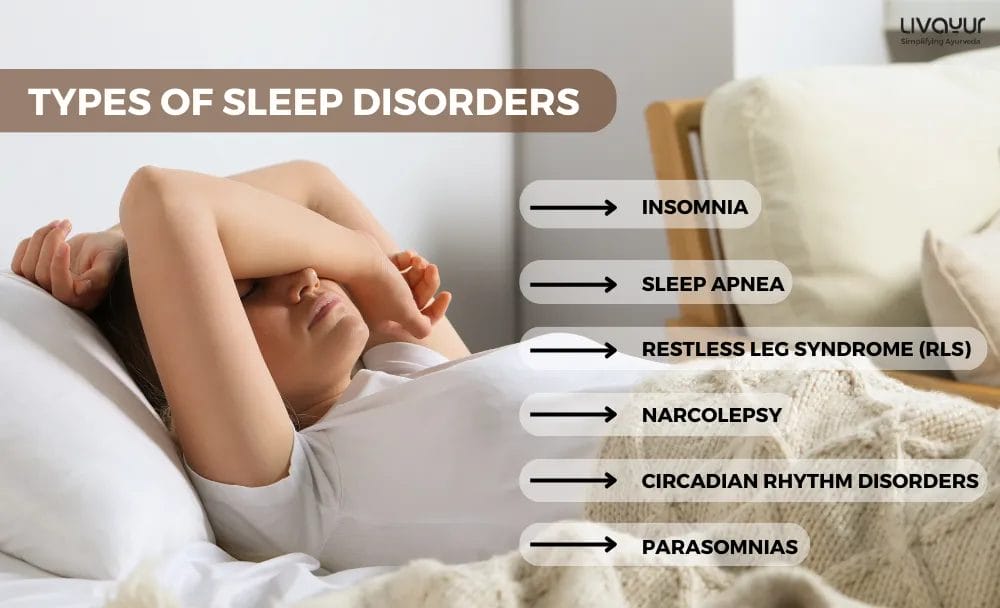This article is reviewed by an expert
A sleep disorder is an umbrella term that can refer to a wide range of conditions that affect the quality, duration, or schedule of sleep, resulting in problems such as daytime sleepiness and fatigue. Common types of sleep disorders include insomnia, sleep apnea, restless legs syndrome, and narcolepsy. If left untreated, sleep disorders can increase the risk of more life-threatening health conditions such as diabetes and heart disease, as well as depression.
The serious threat of sleep disorders is often overlooked in India, but this is a growing problem. A study that appeared in the National Medical Journal of India reported sleep disorders or poor sleep quality in over 36 percent of the population in parts of rural India, while rates in urban areas would be even higher [1].
Sleep Disorder Causes
Recognizing the causes of sleep disorders is the first step to addressing them. Some common causes of sleep disorders are [2]:
- Physical disturbances, such as chronic pain, headaches, or digestive problems [1].
- Medical issues, such as sleep apnea, a condition in which breathing stops repeatedly during sleep.
- Psychiatric disorders, such as depression, anxiety, or post-traumatic stress disorder.
- Environmental issues, such as noise, light, temperature, or your partner’s snoring.
- Lifestyle factors, such as jet lag, shift work, caffeine intake, alcohol consumption, or irregular sleep habits.
- Medications, such as antidepressants, stimulants, corticosteroids, or beta blockers.
Some sleep disorders may have more than one cause or may even be influenced by genetic factors.
Sleep Disorders Symptoms
Sleep disorders symptoms may vary, depending on the type and severity of the condition, but some general symptoms include [3]:
- Difficulty falling or staying asleep
- Daytime fatigue and low energy
- Moodiness and loss of focus
- Excessive daytime sleepiness
- Unusual breathing patterns with snoring and disrupted breathing
- Unusual or unpleasant urges to move while falling asleep
- Unusual movement or other experiences like nightmares while asleep
- Unintentional changes to your sleep/wake schedule
Types of Sleep Disorders
There are several different types of sleep disorders and these are the most common ones [4]:
- Insomnia: This is the most common sleep disorder, characterized by difficulty falling asleep, staying asleep, or waking up too early.
- Sleep Apnea: Sleep apnea is a disorder in which breathing repeatedly stops and starts during sleep. It can lead to poor sleep quality, and even more serious health issues if left untreated.
- Restless Leg Syndrome (RLS): RLS is a disorder in which people feel an irresistible urge to move their legs, often accompanied by unpleasant sensations in the legs.
- Narcolepsy: Narcolepsy is a neurological disorder characterized by excessive daytime sleepiness, sudden and uncontrollable episodes of falling asleep during the day, and sometimes, muscle weakness triggered by strong emotions.
- Parasomnias: Parasomnias are a group of sleep disorders that involve abnormal movements, behaviors, emotions, perceptions, and dreams during sleep. Examples include sleepwalking, night terrors, and REM sleep behavior disorder.
- Circadian Rhythm Disorders: Circadian rhythm disorders occur when your internal body clock is out of sync with your sleep schedule. Shift work disorder and jet lag are common examples of this type of disorder.
It’s important to note that many people experience more than one type of sleep disorder, and sometimes they can be interrelated or exacerbate each other.
Diagnosis of Sleep Disorders
Diagnosing sleep disorders typically involves a combination of medical history, physical examination, and sleep testing. Common methods of sleep disorder diagnosis include [5]:
- Medical history looking into sleep habits, health conditions, and any medications or supplements you may be taking.
- Physical examination to check for any underlying medical conditions that could be contributing to your sleep problems.
- A polysomnogram or sleep study is a non-invasive test that measures various body functions during sleep. This test can help diagnose sleep apnea, narcolepsy, and other sleep disorders.
- Multiple Sleep Latency Test (MSLT) may be used to diagnose narcolepsy, measuring how long it takes you to fall asleep during the day and identifying excessive daytime sleepiness.
- Actigraphy is a non-invasive method of monitoring sleep-wake cycles over an extended period, typically several days or weeks. It involves wearing a small device on your wrist that measures your movements, and it can help diagnose circadian rhythm disorders.
Modern Treatments of Sleep Disorders
Sleep disorder treatments will depend on the specific type of disorder and the severity of symptoms. Here are some common treatments for sleep disorders [6]:
- Lifestyle Changes: In many cases, lifestyle changes can help improve sleep quality. This can include establishing a regular sleep schedule, avoiding caffeine and alcohol before bedtime, and engaging in regular exercise.
- Cognitive-behavioral therapy (CBT): CBT is a type of talk therapy that can help change negative thoughts and behaviors that can contribute to sleep problems. CBT has proven efficacy for insomnia, sleep apnea, and other sleep disorders [7].
- Medications: There are several medications available to treat sleep disorders, including insomnia and restless leg syndrome. However, these medications should only be used under the guidance of a healthcare provider as they pose a serious risk of side effects.
- Oral Appliances: For mild to moderate sleep apnea, oral appliances such as a mouth guard can be effective in keeping the airway open during sleep.
There are other sleep disorders treatments as well, such as surgery or the use of CPAP therapy, but these are only recommended in specific situations.
Ayurvedic Treatment of Sleep Disorders (8)
Ayurveda considers sleep as one of the three main pillars of a healthy life. According to this ancient science, sleep helps in the restoration of the body and mind, and any disruption in this natural process can lead to sleep disorders.
Fortunately, Ayurveda has numerous natural remedies that can help people struggling with sleep disorders.
Ayurvedic medicine recommends the use of certain herbs, like Brahmi, Shankhpushpi, Vacha, Sarpagandha, Ashwagandha, and Jatamasi, to produce a calming effect on the mind and induce sound sleep.
Ayurveda also recommends taking the help of Shirodhara, an Ayurvedic therapy which involves the rhythmic pouring of herbal medicated oil onto the forehead of the person.
Shirodhara helps reduce the hyperactivity of nerves, alleviate stress, calm the mind, and stimulate the pituitary gland. It also helps in the proper functioning of other endocrine glands, leading to better and sound sleep.
Conclusion
Ignoring sleep disorders as a minor problem is a common mistake but one that you can easily avoid. Sleep disorders are easy and inexpensive to treat, but if ignored, they can give rise to serious problems that are often chronic, harder to treat and expensive to live with.
Disclaimer: This article is written from a health & lifestyle perspective. Please consult a trained medical practitioner at all times. These are general information only and are not intended to replace professional advice or treatment.
References:
- https://nmji.in/prevalence-and-determinants-of-sleep-disorders-in-a-community-in-rural-southern-india/
- https://medlineplus.gov/sleepdisorders.html
- https://www.nhs.uk/every-mind-matters/mental-health-issues/sleep/
- https://www.cdc.gov/sleep/about_sleep/key_disorders.html
- https://www.ncbi.nlm.nih.gov/pmc/articles/PMC3181779/
- https://www.cancer.gov/about-cancer/treatment/side-effects/sleep-disorders-pdq
- https://www.ncbi.nlm.nih.gov/pmc/articles/PMC6796223/
- https://www.researchgate.net/publication/346475716_Insomnia_A_Study_on_Sleeping_Disorder_with_the_Reference_of_Ayurvedic_Herbs





















